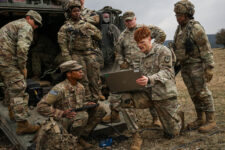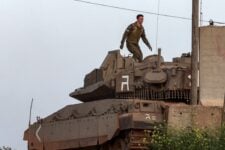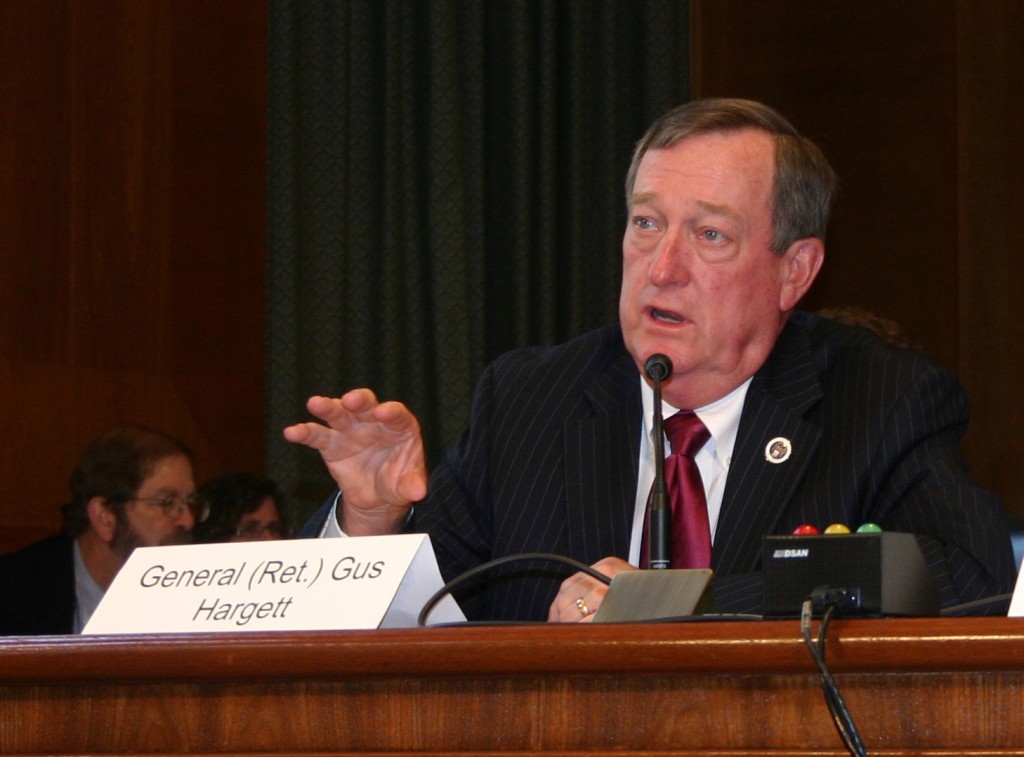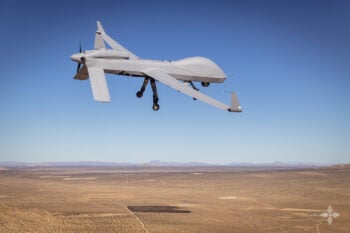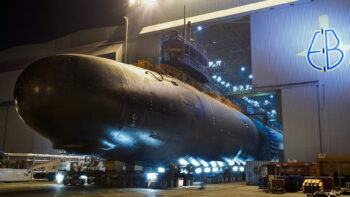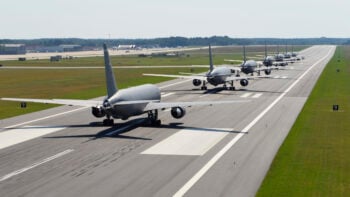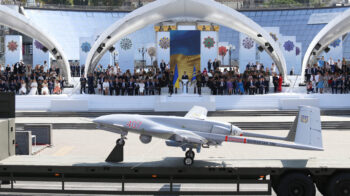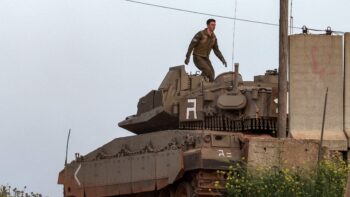The regular Army and the National Guard are increasingly at loggerheads — not because they don’t respect each other, but because both want to protect their funding, their mission, and their people from zero-sum budget cuts. We asked the chiefs of the two leading advocacy groups involved to present their very different views for the way ahead.
In this op-ed, we hear from the president of the National Guard Association of the United States (NGAUS) and former Adjutant-General of Tennessee, Maj. Gen. Gus Hargett, who argues the new congressional commission on Army issues needs to take on old assumptions about what “ready” and “reserve” really mean. Click here to read the counterpart piece by the president of the Association of the United States Army (AUSA) and former Chief of Army Staff, Gen. Gordon Sullivan. We’ll let you judge for yourself who’s right about what. — The Editors.
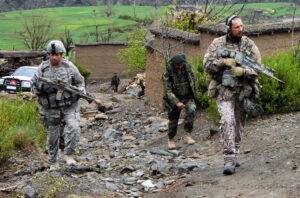
A Michigan National Guard soldier patrols in Afghanistan alongside an Afghan soldier and a Latvian ally.
The National Guard Association of the United States is confident the White House and Congress will choose wisely when selecting the men and women to sit on the National Commission on the Future of the Army.
The commissioners must be open-minded, forward-thinking individuals with knowledge of all three components of the Army (the active force, the Reserve and the National Guard). We wish them well as they begin their important duties and offer our thoughts on issues they should discuss during their months of study and consideration.
A well-trained and well-equipped Army is critical to the defense and security of the United States. Air and naval power are vital tools in America’s arsenal, but wars will always require troops on the ground to confront the enemy and reassure the local populace.
The Army, of course, is about “fighting tonight,” getting to the battle quickly to seize the initiative from the enemy. That should always be the Army’s core purpose.
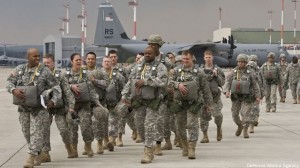 Immediate power projection overseas is not what the National Guard does. That is not the Guard’s role in the nation’s security. We are principally an operational reserve, the Army’s primary combat reserve, designed to arrive at the fight after the match has been struck.
Immediate power projection overseas is not what the National Guard does. That is not the Guard’s role in the nation’s security. We are principally an operational reserve, the Army’s primary combat reserve, designed to arrive at the fight after the match has been struck.
But we ask the commissioners to consider the practical aspect of “fighting tonight.” America is short on airlift and sealift. Only a small number of light units can reach the fight tonight or even tomorrow or the day after that.
In fact, it would take several months, as it did in the first Persian Gulf War and the invasion of Iraq, to prepare and move overseas a large active-component fighting force. In that same amount of time, Army Guard brigades could be mobilized, trained and delivered anywhere in the world.
This has been done often in the years since 9/11. The Guard has never failed to answer a call.
So aren’t those late-arriving active-component units a reserve force as well, far costlier than the same units in the Army Guard, yet no quicker to the battlefield? This is a key issue for the commission as it considers the proper balance of reserve and active components for the Army.
We presume this force will be at the proper level of readiness. But with today’s budget troubles, we can’t be certain. Overall readiness is dependent on individual readiness. And that is dependent on resources.
Sequestration is creating doubt across the military that the level of readiness needed for combat can be sustained. On this, I agree with the Army chief of staff, Gen. Ray Odierno. These automatic across-the-board budget cuts treat weapons systems the same as Pentagon office furniture. The commission must look at the impact this ill-conceived effort to cut government spending is having on the world’s greatest military.
 While the chief of staff and I agree on sequestration, we do not agree on the Army’s plan to transfer all AH-64 Apache attack helicopters from the Army Guard to the active component. This idea, also ill-conceived, is part of the Army’s Aviation Restructure Initiative.
While the chief of staff and I agree on sequestration, we do not agree on the Army’s plan to transfer all AH-64 Apache attack helicopters from the Army Guard to the active component. This idea, also ill-conceived, is part of the Army’s Aviation Restructure Initiative.
The commission will learn that the Army’s most-experienced Apache pilots and maintainers are in the Army Guard. And because Guardsmen are inherently more cost effective than their active-component brethren, a conclusion reached again and again in countless recent studies, these Apache pilots have a built-in efficiency that would be discarded under an Army plan designed to save money.
The Army would replace the Apaches with UH-60 Black Hawk utility helicopters, saying they are a better fit for the Guard’s domestic mission. But no governor has endorsed this plan. Neither has one adjutant general. In fact, they adamantly oppose it.
Plus, the Army Guard provides a soft landing for Apache pilots who leave the active component but still want to serve, preserving the significant taxpayer investment in their training.
The commissioners will understand that the Army Guard is meant to be the primary combat reserve of the active-component Army. They will know that the two components should almost mirror each other in every way, both capable of performing all missions and training to the same standards.
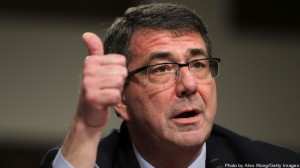
Ashton Carter
In the war on terrorism, Guard and active-component units have fought side by side with no discernible difference in capability. Ash Carter, who is likely to be the next defense secretary, told an audience at the National Press Club in 2013, “You can never tell the difference between an active-duty and reserve-component unit in terms of their proficiency and dedication.”
Commissioners also must be made aware that the Total Force policy has served this country well. Perhaps they should speak with former Defense Secretary Melvin Laird. He announced the Total Force concept in August 1970 when the nation was still fighting in Vietnam, believing that America should never go to war again without a strong reliance on the National Guard and the Reserves.
He knew what we have seen since our nation was attacked on 9/11: When the Guard is involved, so is America.
The commissioners will hear about the 1 percent fighting the war and the resulting disconnect between America’s warriors and its citizens. But they also will hear time and again as their investigation continues that the nation’s neighborhoods and communities are plugged in when their schoolteachers, farmers, policemen and shop owners are called to duty in the National Guard.
The commissioners will have a heavy responsibility. They will be recommending the design of an Army that will serve the nation for decades to come at a time when threats are difficult to predict and our federal budget is in need of an overhaul.
Their recommendations will arrive early next year, just months before a presidential election. The commission’s findings, then, will be fresh just as new faces fill leadership positions in the Army and the Defense Department.
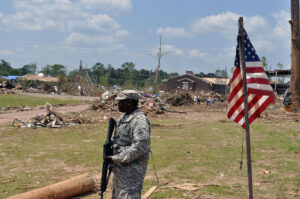
An Alabama National Guard private stands watch after a devastating 2011 tornado.
This commission’s importance cannot be overstated. We believe it must ultimately recommend an Army affordable to the taxpayer and right for the nation’s defense and security.
We’re certain the Army National Guard will have a major role in that force.
Retired Maj. Gen. Gus Hargett is president of the National Guard Association of the U.S. (NGAUS), perhaps the single most powerful American defense advocacy group.
Gray Eagle is the low-cost, low-risk answer to Army modernization
Gray Eagle STOL and Gray Eagle 25M are the best options for Army aviation as it assesses where to move from its current inflection point.




